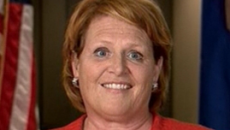After Re-Electing A Bunch Of Incumbents, Americans Demand Term Limits

There is nothing that baffles me more than the term limits issue.
On one hand, term limits are a pretty popular concept among Americans. Proposals to end term limits for the President are routinely panned. Voters talk about term limits endlessly, suggesting that “fresh blood” in Washington from time to time is a good thing. A recent Gallup poll found overwhelming support for the concept among all political affiliations:

But here’s the thing: If Americans really want term limits, why do we spend so much time voting for incumbents?
The 2012 election was a “status quo” election. We re-elected the president, and only 10 seats in Congress (8 in the House, 2 in the Senate) changed partisan hands. In the 2010 elections, widely seen as a “wave election” bringing great change to Washington DC, just 6 of 33 Senate seats that were up for re-election changed partisan hands. In the House, just 63 seats out of 435 changed hands.
That at a time when national approval numbers for Congress were routinely measured in the single-digits.
“In other words, the message here is: Stop me before I vote for another incumbent!” writes Ed Morrissey. That’s exactly right.
The problem here is that Americans are, politically, schizophrenic. We say we want one thing, yet we do another.
Nor is this the only place where American voters are decidedly hypocritical. For instance, we say we want to reduce the national debt, yet we’re unwilling to see cuts in spending that benefits our local communities or ourselves as individuals. We deplore the budget deficit, and the national debt, but we won’t give widespread support to those who will reform entitlements and other problem areas of spending.
We demand government solutions to every problem under the sun, we support bigger government programs, but we refuse to support the tax hikes to pay for them.
We want the benefits of big government without paying for it. We want to eliminate the budget deficit, but we don’t want broad tax hikes or spending cuts to accomplish it. We say cynical about politicians and their greed and love of power, yet we keep sending largely the same group of people back to the halls of power election after election.
We’re quick to blame our nation’s problems on dysfunction in Washington DC, and the character flaws of our leaders, but the problem is us.







